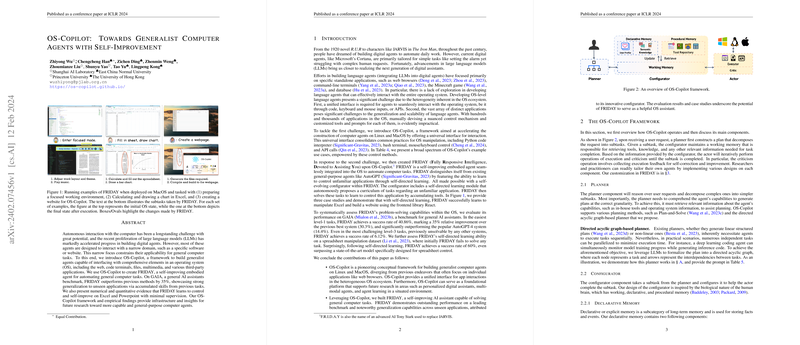OS-Copilot: Enabling Generalist Computer Agents through Self-Improvement
Introduction to OS-Copilot and FRIDAY
In the quest to augment digital assistance capabilities, OS-Copilot emerges as a pivotal framework designed to foster the development of generalist computer agents on Linux and MacOS platforms. By providing a unified interface for diverse operating system interaction methods, including Python code interpretation, bash terminal, mouse and keyboard control, and API calls, OS-Copilot significantly lowers the barriers to building sophisticated computer agents. The paper introduces FRIDAY, a self-improving, embodied agent developed atop the OS-Copilot framework, specifically tailored for automating a wide array of computer tasks. FRIDAY distinguishes itself by not only demonstrating exemplary performance in automation tasks but also showcasing an unparalleled ability to learn and control unfamiliar applications with minimal external guidance.
FRIDAY’s Architectural Overview
The architectural underpinning of FRIDAY revolves around a planner, configurator, and actor components synergy. The planner delineates complex tasks into manageable subtasks through a directed acyclic graph-based approach, allowing for parallel processing and efficient task management. The configurator, inspired by the human brain’s memory components, consists of declarative memory for storing user preferences and semantic knowledge, and procedural memory for housing a tool repository. This configuration facilitates FRIDAY’s learning and adaptation process, providing it with a continually evolving skill set. The actor component, comprising execution and self-criticism stages, executes subtasks within the operating system, employing the universal runtime environment provided by OS-Copilot for seamless operation across a diverse application spectrum.
Empirical Evaluation and Findings
FRIDAY was systematically evaluated on the GAIA benchmark, a comprehensive testbed for general AI assistants. The results were compelling, with FRIDAY achieving a 40.86% success rate in level-1 tasks, marking a 35% relative improvement over previous methods. Furthermore, FRIDAY demonstrated capabilities in self-directed learning, significantly enhancing its performance on spreadsheet manipulation tasks previously unsolvable. This illustrates FRIDAY’s robust self-improvement mechanics and its potential to transcend the capabilities of existing digital agents.
Implications and Future Directions
The introduction of OS-Copilot and the development of FRIDAY herald a significant advance in the field of generalist computer agents. This framework not only sets a new benchmark for agent capabilities but also provides a fertile ground for future research in personalized digital assistants, multi-modal agents, and agent learning in situated environments. The adaptability and self-improving nature of FRIDAY underscore the potential for more nuanced and autonomous computer agents capable of handling an increasingly broad array of tasks. Looking forward, integrating visual input and action generation capabilities, alongside enhancing multimodal interactions, remains a promising avenue for extending OS-Copilot’s utility and FRIDAY’s versatility. Moreover, addressing the challenges in agent evaluation, safety, and interpretability is critical for the practical deployment and acceptance of such advanced digital assistants.
Conclusion
The OS-Copilot framework, augmented by the FRIDAY agent, represents a significant stride towards realizing highly capable and general-purpose computer agents. This development not only expands the horizon for digital assistance technology but also propels forward the discussion on the potential and implications of autonomous agents in our daily computing environments.
